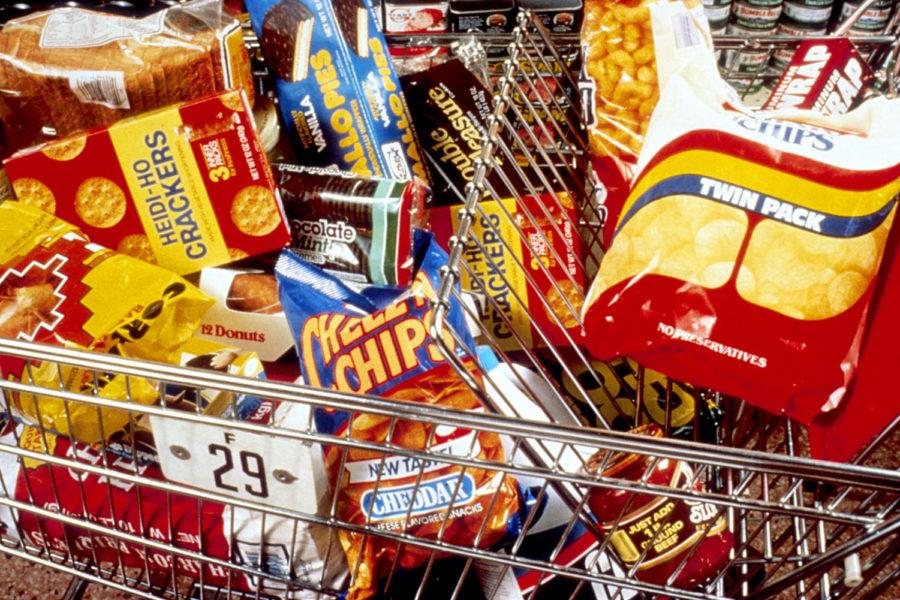Bahl: Social food pressures trash health
In college, people don’t really care who you are, who you were, or what you do. But peer pressure still makes its appearance and often in subtle ways. Especially when it comes to eating habits.
April 28, 2014
We have all known about the power of peer pressure since we were in middle school. We were taught things like say “no” to drugs, don’t give in to bullying and don’t let anyone make you do something you don’t want to do. Those are obvious examples and were probably more difficult to deal with in high school when acceptance from your peers meant everything and you would do almost anything to look cool or fit in. Luckily, in college people don’t really care who you are, who you were or what you do. But peer pressure still makes its appearance and often in subtle ways — especially when it comes to eating habits.
It is common knowledge that eating is a social event. In cultures all over the world, mealtimes are special times to meet up with friends and family, catch up and do life together. In Spain, lunch is a social affair in which time is taken out of the day to relax and indulge in tapas and community. Of course, here in the United States, we go out to coffee with friends or might run to Coldstone when the craving hits. The sociality of eating and mealtime is what makes it pleasurable and fun, but it can also be a hidden detriment to health. The effects of peer pressure can lead to making bad health decisions just because your friends or peers are making certain choices.
First off, a lot of college students don’t really think twice about their diets or concern themselves too much about whether pizza is bad for them or not. If it tastes good, you eat it. That is completely fine, and is a lot of what college is about: late night Jeff’s Pizza, copious amounts of Ramen and probably too many Texas Roadhouse rolls. However, for the many students who are concerned about their dietary choices and health right now, it can be a daily challenge to make the healthy choices they want to make while also having fun and indulging with their peers.
From personal experience, it is difficult to balance the internal cues to eat nutrient dense foods and healthy options with the pressure from friends to run to the C-store for a late night snack or pint of Ben and Jerry’s. Unless you have iron willpower, which most people probably don’t, peer pressure will always win. Of course, in this kind of situation the pressure is not really negative or dangerous but more light-hearted and fun.
There is no malicious intent to get you to eat fatty, sugary foods, but a motivation to conform to the people around you. Most people can testify that it would be really awkward if a group of friends went out to eat and a single person “sat out” and didn’t eat because it wasn’t healthy. Or for “girl’s night,” if everyone got a pint of ice cream and the last person didn’t want any and sat there rather out of place while everyone ate. This is why the college can be such a toxic environment for making good choices. Even for someone who came to school following a “perfect diet” and never ate chocolate, fast food or desserts, it is hard to keep it up here.
It is a combination of the dangerous proximity and availability of the junk food, the stress that drives cravings, topped off by the exact peer pressure I’ve discussed. Undergraduate Taylor Howieson says it perfectly, “I would never drive to Casey’s to get a candy bar, but with the C-store, you can just run over really quick…and you don’t have to use money. You can just use your Dining Dollars.”
Scientifically, there is evidence that peer pressure really does drive eating habits. Food science and human nutrition lecturer Rose Martin discusses that there is a high correlation between body weights and who you are friends with. In a 2011 study, Martin says that you are more likely to be friends with people who have similar weights or waist circumferences as you. That may seem trivial or ridiculous, but look at your friend group. Are they similar in body shape to yourself? Blogger Christine Junge attributes this to peer pressure, as we’ve seen, collaboration and mirroring. You are more likely to agree on a normal body shape and acceptable eating patterns with the people you hang out with, so that can be a driving factor. With mirroring, it is more based on observation. What we see, we tend to do. If your friend is getting a burger, you’ll probably get a burger.
So why does any of this matter? It’s just about eating and having fun, right? Well yeah, sure, but this peer pressure effect can be channeled into some productive energy. Rather than encourage and affirm each other that unhealthful choices are alright, why not encourage each other to make good choices? If you and your friends are all in it together, it will make it so much easier to succeed. Of course, if you are not really concerned about any of this right now, it is fine, but someday you probably will be. And it’s a lot easier to form habits now rather than sometime down the road when you are bombarded with heavy business lunches and post-work social gatherings.







